|
|
|
Sort Order |
|
|
|
Items / Page
|
|
|
|
|
|
|
| Srl | Item |
| 1 |
ID:
111900
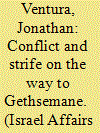

|
|
|
|
|
| Publication |
2012.
|
| Summary/Abstract |
Marian rituals have been the apex of Christian believers' journey for centuries. Although its research importance in many disciplines, Marian devotion and rituals in Israel have been largely neglected. This article outlines several social and religious aspects of 'the public dimension of the ritual'. These aspects include several lines of conflict and strife taking place between a myriad array of socio-ethnic groups: between the Greek Orthodox and the Palestinian Greek Orthodox communities; between the Palestinian Greek Orthodox communities and clergymen; between Palestinian believers and pilgrims; and between the Greek Orthodox and Jews/Muslim believers. This research is based upon a combination of two principal qualitative methodologies: participant observations which took place over a period of three years and in-depth interviews with believers and clergymen. The fieldwork is focused around a procession taking place in the Old City of Jerusalem at the end of August, celebrating Mary's death and resurrection.
|
|
|
|
|
|
|
|
|
|
|
|
|
|
|
|
| 2 |
ID:
111897
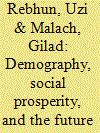

|
|
|
|
|
| Publication |
2012.
|
| Summary/Abstract |
The expanding recognition of the two-state solution for the Israeli-Palestinian conflict ostensibly removes an immediate demographic threat to Israel that the Arab inhabitants between the Mediterranean Sea and the Jordan River will soon outnumber the Jews. The demographic and social concern of maintaining the character of the State of Israel as the place where the Jewish people can realize their right to self-determination and can ensure a solid Jewish majority should be directed inward. Israel also wishes to continue to be a prosperous and developed country. This paper examines the changing proportions and characteristics of specific population subgroups and their effect on Israel's future as a Jewish and prosperous state. Further it argues that the demographic composition does not allow Israel to accept the demand for the 'right of return' whereas the two-state solution should involve the settlement of the Palestinian refugees in the new Palestinian state. The article discusses broader meanings of the demographic dimension for the Jewish and Arab populations in Israel.
|
|
|
|
|
|
|
|
|
|
|
|
|
|
|
|
| 3 |
ID:
111899


|
|
|
|
|
| Publication |
2012.
|
| Summary/Abstract |
This article presents a regression analysis of some of the factors that influenced the value of the Israeli shekel from 1999 to 2008. The regression results show that changes in domestic expectations for peace in Israel had a significant effect on the value of the shekel. These results combined with a review of the political and economic developments in 2002 suggest that the exchange rate crises in the Israeli foreign currency market in the second quarter of 2002 was due to a decrease in expectations for peace and that the exchange rate stabilized in the end of the quarter due an increase in expectations for peace in Israel in the end of June.
|
|
|
|
|
|
|
|
|
|
|
|
|
|
|
|
| 4 |
ID:
111902
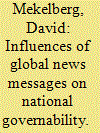

|
|
|
|
|
| Publication |
2012.
|
| Summary/Abstract |
The environment has been forced to the margins of Israeli political discourse in the past and has received little attention from formal institutes. Nevertheless, since the mid-1980s, environmental consciousness and public discourse have increased, mainly encouraged by Israeli civil society. This paper argues that since Israeli governmental and educational systems do not deal with environmental issues, the development of environmentalism in Israeli society is the outcome of a three-step process: first, an increase in the homogenization of cross-border messages; in turn this contributes to the homogenization of principles, norms, rules and decision-making procedures; and finally, plays a role in creating a greater sense of belonging to the global community. The paper probes the development of global environmental messages' influence on Israeli society and politics between the two first main UN environmental conferences of 1972 and 1992 by presenting a qualitative and quantitative analysis of The New York Times (USA), The Times (UK) and Ma'ariv and Yediot Ahronot (Israel) during the time of these conferences. A comprehensive survey is presented, along with interviews with representatives from 78 environmental NGOs in Israel that were established by 1995.
|
|
|
|
|
|
|
|
|
|
|
|
|
|
|
|
| 5 |
ID:
111898
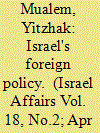

|
|
|
|
|
| Publication |
2012.
|
| Summary/Abstract |
Arms sales are a prominent issue in Israeli foreign policy. This subject has influenced the history of the state in the international arena. Arms sales serve two main goals: economic improvement, and a means for shaping the domestic policy of the recipient state. The government of Israel has acted to improve its relations with the recipient countries in the political and strategic areas in the framework of its foreign aid to those countries. Yet it has acted to change the policy in those countries - Ethiopia, Argentina and Iran - pertaining to their indigenous Jewish communities.
|
|
|
|
|
|
|
|
|
|
|
|
|
|
|
|
| 6 |
ID:
111903
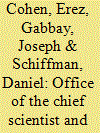

|
|
|
|
|
| Publication |
2012.
|
| Summary/Abstract |
The Office of the Chief Scientist (OCS) provides public financing for high tech Research and Development. This article describes the OCS and its evolution since 2000, and assesses the government's response to crises in venture capital financing during 2001-03 and 2008-10. It finds that the government's response was inadequate in 2001-03; the OCS budget was reduced, and essential reforms were adopted belatedly. In 2008-10, the picture is mixed; the OCS budget was increased in 2009, then reduced in 2010. In July 2010, the government proposed a comprehensive package of reforms, whose impact remains to be seen.
|
|
|
|
|
|
|
|
|
|
|
|
|
|
|
|
| 7 |
ID:
111901


|
|
|
|
|
| Publication |
2012.
|
| Summary/Abstract |
This article presents two coping paths available to Palestinian women in Israel today - turning to a traditional healer in the community, an act that represents turning 'inwards', and pursuing higher education, an act that represents turning 'outwards'. These two paths enable coping - particularly in times of societal transition - and provide opportunities for the women who utilize them. On the other hand, each of these paths is laden with unique challenges and the women who take them must often pay a price. Despite the differences between them, the article reflects the similar ramifications of these coping paths on the women's lives.
|
|
|
|
|
|
|
|
|
|
|
|
|
|
|
|
| 8 |
ID:
111896
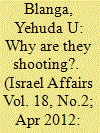

|
|
|
|
|
| Publication |
2012.
|
| Summary/Abstract |
This article examines the episode of an almost-forgotten war in the history of the Middle East conflict - the War of Attrition. While everyone agrees that the War of Attrition ended on August 7, 1970, there is controversy over when the war broke out. Some consider it to have begun in the summer of 1968 and others believe that it began with the bloody events that occurred immediately after the Six Day War. The IDF considers March 8, 1969 to be the day the war broke out because from that day on there was continuous fighting with the Egyptian side of the Suez Canal.
To show the American and Israeli failure, in the first four months of hostilities along the Suez Canal, to understand that the area was facing renewed conflict and another round of war. A direct consequence of that failure was the inability of both sides to adopt a suitable policy towards the emerging crisis. The article examines the beginning of the War of Attrition in the diplomatic arena, the Egyptian aims and objectives, and the American reaction. Other than presenting the facts, this article examines what the United States thought of the Egyptian moves, if and how much the United States was influenced by those moves, and Egyptian President Gamal Abdel Nasser's reaction to the steps taken by the Americans. Since the main focus is on the American foreign policy, most of the sources used for this article are American. In order to complete the picture, it is also important to examine the Israeli point of view and the last part will focus on that.
|
|
|
|
|
|
|
|
|
|
|
|
|
|
|
|
|
|
|
|
|